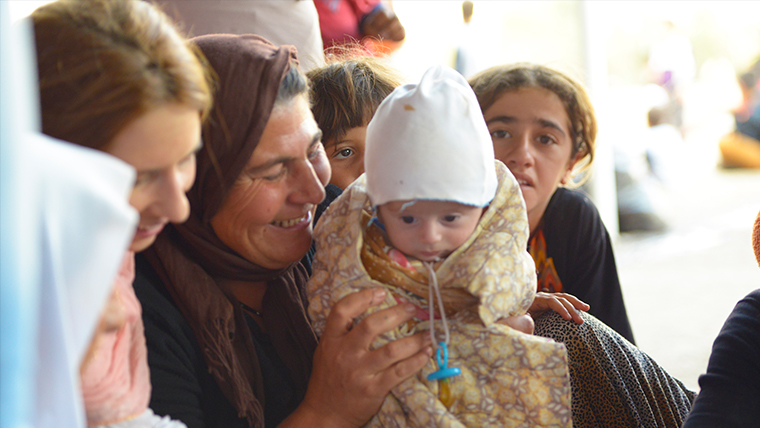Winter is a time of fear for families in Za'atari
As the Middle East prepares for another harsh winter, the situation facing the estimated 11 million Syrians displaced by the crisis becomes even more difficult. The cold is particularly dangerous for young children, and those living in informal tents and sub-standard buildings. Ahead of tomorrow’s Coats for Syria fundraiser, we speak to the parents of 20 month old Nouras about their worries.
 Winter for Syrian refugees hits the most vulnerable the hardest
Winter for Syrian refugees hits the most vulnerable the hardest
By Lauren Fisher, World Vision Emergency Communications
Nouras’ name translates in English to ‘gull’ - a bird that loves freedom and scampers about from place to place. If you’ve ever spent time with the 20-month-old toddler, it’s a name that makes sense. Nouras flits around - crying one minute because he wants the tea the adults are drinking, and laughing the next when he kicks his bouncy ball.
With another little one on the way in two months time, his young parents Anwar and Salam have their hands full. But it’s the coming cold weather that keeps them up at night. They live in Jordan’s Za’atari refugee camp in a small metal trailer.
“I am scared. The weather is getting colder,” Nouras' father Anwar says worriedly.
Salam smiles when she talks about the pregnancy, but that smile quickly passes when asked if she’s worried about the future. “I am a little bit scared,” she says. “Every woman who is pregnant here is a bit scared. The most frightening part is afterwards – with a newborn. The cold weather, the food and the condition of the food, and wondering if it will all be ok for the new baby.”
In another section of the camp, Myada, her husband Fo'ad, and their four children, aged between nine and 14 years old, are counting blankets. They live together in a tent.
“During the day it is fine - we have a heater,” she says. “But at night we just pile more and more blankets on the children while they are sleeping.”
Turning the heater off at night, just when it’s most needed, may seem counter-intuitive. But for this family, it’s for their own safety. Last winter they witnessed seven of their neighbours’ tents burn down. A cold, drafty tent is better than nothing at all when temperatures begin to dip.
“We have no winter clothes for the children and I,” Fo'ad explains.
Even worse, they say, is the flooding. Winter often means rain. Last year, the rain left many Za’atari residents with knee-deep water in their tents. Fo'ad tells me that a short rain earlier in the week soaked their mattresses and ruined all of their bread. He can’t imagine what another winter of heavy rain will mean for his family.
These families’ stories are not unusual. Many in the camp are looking to the upcoming winter with only a prayer of hope. In Jordan, they have a saying for the period of time between late December and February – “the forty days.”
World Vision is hoping to help, working with the wider humanitarian community to look at the needs in the Za’atari camp. Plans include digging drainage ditches to help prevent flooding and providing items like baby clothes or winter coats to families in need.
In the meantime those in Za’atari wait, hoping the hardest "forty days” are not more than their families can take.
To help the Syrian refugees prepare for the harsh winter conditions, World Vision is working to provide assistance to those living in tents and unfinished buildings, providing blankets, winter clothing, mattresses and gas heaters. However, as the crisis approaches its fifth year, funding for such initiatives is increasingly scarce and unpredictable. Please help fundraise by going without your coat tomorrow, Friday 23 January. You can find out more about the event here: www.worldvision.org.uk/coats